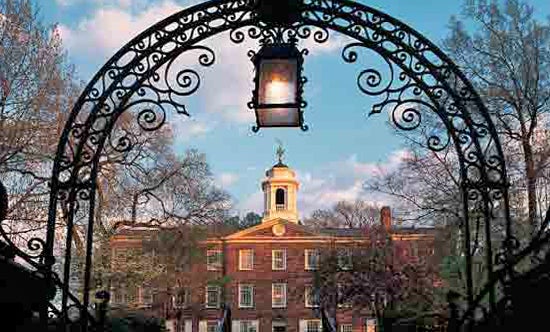Rutgers University’s 59 member Board of Trustees downsized to 41

With consent from Rutgers’ two university-wide governing boards, members of the New Jersey Senate and General Assembly voted last week to shrink the university’s board of trustees, presumably ending a multiyear power struggle between the state and the school.
After several attempts by Senate President Steve Sweeney (D-Gloucester) and others to impose changes on Rutgers’ governing structure, both sides compromised by reducing the number of trustees from 59 to 41.
On Thursday, Dec 18, the university’s board of trustees and board of governors approved the change, which required an act of legislation because it modified a fundamental 1956 contract between Rutgers University and elected officials. As per the agreement between Rutgers and Trenton, lawmakers passed a bill that mirrors the boards’ resolutions verbatim.
Board of trustees Chair Sandy Stewart said he thinks the change is a good one.
“We were very thoughtful about what changes we wanted to make and we had a series of very deliberate conversations with lawmakers,” he said.
“These reforms will improve the effectiveness of governance at Rutgers so that the state university can build on its success and meet the challenges of higher education in a rapidly evolving world,” said Sweeney in a statement
The two boards have different roles and responsibilities. The board of governors oversees operations at the university. The board of trustees serves mostly in an advisory capacity and is responsible for certain transactions involving property, funds, and trusts.
The reductions will come in two ways. First, there will no longer be members who sit both on the board of trustees and the board of governors. Second, five trustee positions will be eliminated by attrition.
Since the New Jersey Medical and Health Science Education Restructuring Act of 2012 changed the makeup of the board of trustees, six members appointed by the governor have concurrently served on the board of governors, along with seven trustees appointed by the board itself. Effective immediately, all 13 of those members will give up their seats on the board, leaving just five gubernatorial (“public”) appointees and 36 private ones.
No changes will be made to the board of governors, which oversees operations at the university.
Some skeptics feared the move would give the governor greater influence over the board of trustees, but the change actually decreases the percentage of gubernatorial appointees from 18 to 12.
The agreement comes at the end of a series of scuffles and controversies that had lawmakers taking aim at the “unwieldy” size of the board of trustees. The first significant attempt by lawmakers came in the early 2000s when the Vagelos Commission attempted a wholesale restructuring of the state’s higher education system. The Board of Trustees successfully blocked it.
The most recent dispute started in 2010, when a gubernatorial task force recommended many high-level changes to public education in New Jersey, including dismantling the University of Medicine and Dentistry of New Jersey and separating the Rutgers-Camden campus and subsuming it in Rowan University. After widespread opposition to the Rutgers-Camden proposal and a threatened legal standoff by the boards, lawmakers passed the higher education act with significant input from board negotiators.
That didn’t end the impasse. In 2012 a scandal erupted within the Rutgers athletic department that led to the firing of the men’s basketball coach and the resignation of the athletic director. At the time, Sweeney called university administrators to hearings. He also blamed problems in the school’s response on the inability of the oversized board of trustees to work with the board of governors, even though the board of trustees played no role in the scandal or its followup.
Sweeney and other Democrats later began introducing bills that sought to reduce or eliminate the board of trustees, increase the size of the board of governors, and establish a task force to study the issue.
Time and again, the boards, acting with renewed solidarity due to the fight over the restructuring act, asserted their belief that changes to either board require approval by the boards themselves. Armed with one of the top lawyers in the nation, the university repeatedly won its game of brinksmanship, and none of these bills went to a full legislative vote.
There’s one notable exception. In June, a Sweeney bill that would have added four new political appointees to the board of governors passed the Senate with the minimum 21 votes. At that point, Sweeney gave the university an ultimatum: to consider and adopt its own reforms or he would send the bill to the Assembly.
But the boards had already launched the process. Last spring, they resolved to open a dialogue with lawmakers and appoint a task force to study whether they might benefit from some changes. In December 2013, the task force returned with some conclusions for the board chairs, not least of which recommended shrinking the board of trustees to a membership between 36 and 43. The boards have already implemented and dismissed other recommendations and will be discussing the remainder over the next few months.
For example, board members decided not to abolish the committee on Alumni and University Relations but they have already reduced the size of joint committees from 15 to eight, and they’ve relieved administrators from having to attend committee meetings that don’t pertain to them. At a board meeting last week, the board of trustees took up the issue of whether to designate trustees emeriti as either active or inactive, based on attendance at meetings.
Also during the legislative votes on Dec 18, the Senate approved two new appointees to the board of governors: Susan McCue, Harry Reid’s former chief of staff, and Mark Angelson, former deputy mayor of Chicago.
____________________________________________
NJ Spotlight, an independent online news service on issues critical to New Jersey, makes its in-depth reporting available to NewsWorks.
WHYY is your source for fact-based, in-depth journalism and information. As a nonprofit organization, we rely on financial support from readers like you. Please give today.




